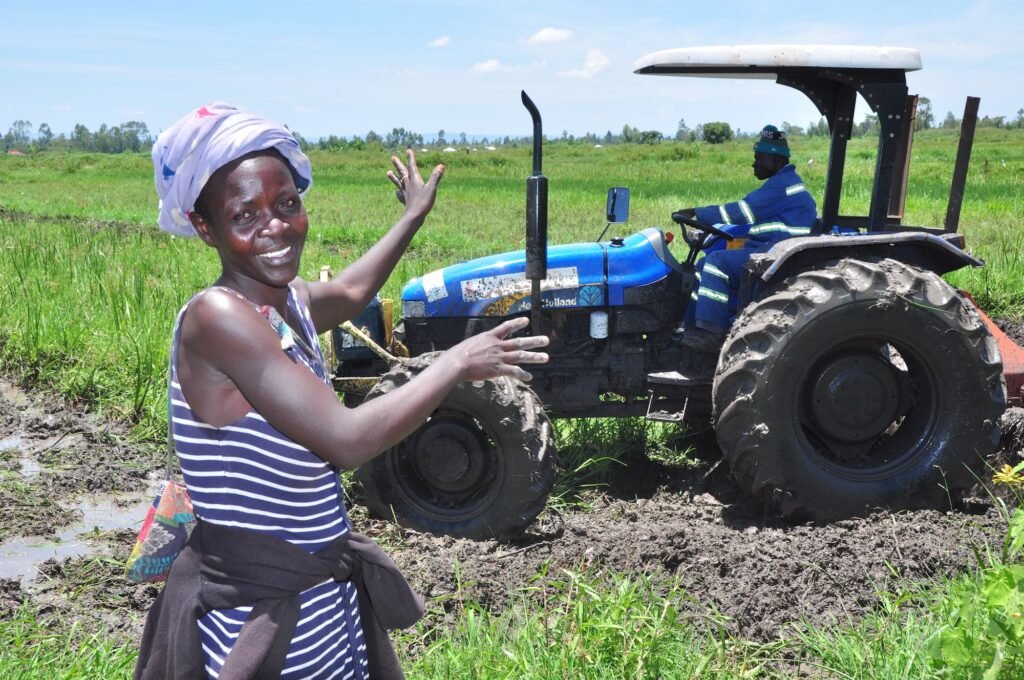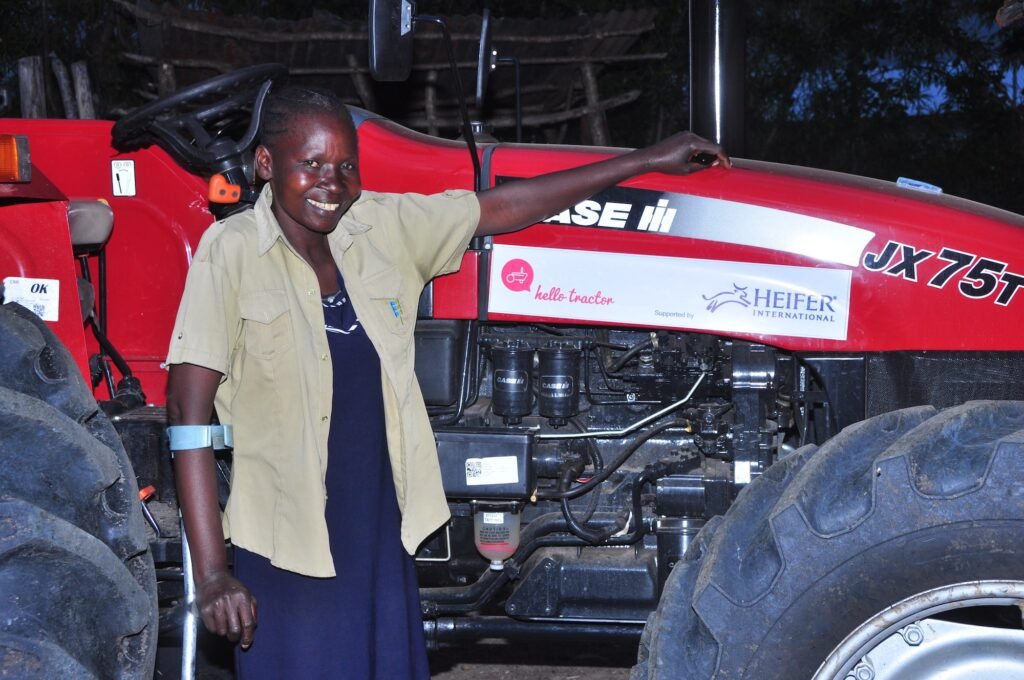By Francis Mwangi and Murimi Gitari
Pay-As-You-Go financing drives access to tractors by Africa’s unbanked
However, development actors like Heifer International are partnering with innovators like Hello Tractor to promote access to modern farm equipment for smallholder farmers. Evalyne Awendo from Kamunda village, Nyando Sub-County, Kisumu County, is one of the beneficiaries of this tractor financing initiative. The mother of four says that she heard about the programme on the radio and she immediately applied to enrol.
She says that her quest to become a tractor owner previously encountered several landmines, including an an ordeal that led to her losing KSh900,000 and hospitalisation in 2016.
“I informed my husband that I was going to withdraw my money and get a loan to get the tractor, unfortunately, I did not succeed and I lost my KSh900,000,” she recalls. Accessing a bank loan to acquire a tractor was difficult as the interest rates offered were high.
But Awendo did not give up. After attending a Pay-As-You-Go (PAYG) tractor financing onboarding training by Hello Tractor and Heifer International, she got a call from Hello Tractor informing her that she had been shortlisted as a potential tractor recipient.
“Something interesting was that I had no single coin to facilitate my transport to the Hello Tractor training. But I eventually managed to receive the training and I now own a tractor that I am using to service
the farms,” she says. “For Hello Tractor and Heifer International, their core aim is to help the farmers and not structure their project like a business.
With banks, it is a business and that is the difference.
As a woman, I am proud, and I tell fellow women not to be afraid. What a man can do, a woman will do better. A fellow woman encouraged me to strive to acquire my own tractor after using other people’s for years. It is a miracle in our village for a woman to own a tractor.”
Rosemary Odhiambo, who started rice farming in 2010, uses the little income she gets to educate and feed her children. Before the tractor project, she would spend a minimum of KSh10, 000 to get her land prepared for planting.
“We used to prepare our land using oxen or jembe, which was labourintensive and costly. I would spend like KSh10,000 but right now the cost has gone down due to KSh5,000-6,000,” she says.
Land preparation would take them a maximum of three months towards the planting season. But with adoption of farm mechanisation, it only takes a maximum of one month.
Booking agents are always available help farmers like Odhiambo with accessing tractor services on time while measurement of their farms is easier through the Hello Tractor mobile app unlike in the past when middlemen and brokers manipulated the measurements. Andrew Abongo, who also owns a tractor, says he can testify to the benefits of the tractor project to his business.
“It has reduced a lot of work for us. You don’t have to follow your operator where he goes, unlike before, when they would do 10 acres, and come in the evening and tell you that they did three acres, the engine is hot, and the tractor was overworked.
You couldn’t even get the value for your investment. For this one you are assured that wherever there is a breakdown you will see the tractor stop at specific hours,” he notes. Charles Ogola, a resident of Sidindi Ward, Siaya County is also one of the beneficiaries. He thanks Heifer International and Hello Tractor for introducing an entrepreneur-friendly tractor financing model.
“What has made me extremely happy is the payment terms. I was informed that I can pay as per the acreages serviced by the tractor. Whenever I plough one acre, I deposit some amount.
So, per day I multiply the amount by the number of acreages. I found this arrangement quite good. When you look at the way I make my payments, I usually exceed the expected amount so that they can understand that I can do the job as required,” says Ogola.
Jehiel Oliver, Founder and CEO of Hello Tractor, says that the PAYG financing model is designed to ensure that borrowers repay their loans based on work done.
The product, he says, is meant to unlock an entirely new class of entrepreneurs working hard to service the farmers in their community without basing the credit facility on collateral.
If you look at the way commercial banks lend today and across the African market, they look at your credit history, they look at how much cash you have in the bank, how much collateral you have.
So, you immediately lock out the vast majority of potential borrowers because most do not meet those criteria,” notes Jehiel. PAYG, he says, focuses on unlocking opportunities for the so-called ‘the unbankable’ who possesses entrepreneurial grit.
“We came into the market with a different hypothesis. We are betting on people, not their financial profiles, because most of our customers do not have bank relationships.
What we’re saying is we understand the tractor business. We understand that business can be profitable, but we have to select the right entrepreneur,” he says. Agnes Kavatha, the Digitization Manager at Heifer International Kenya, says the project
was informed by the realisation that smallholder farmers often face challenges in accessing farm equipment to prepare their land for production while putting into consideration that Africa has arable land that is largely underutilised due to the unavailability of enough tractors. Kavatha says the initiative is also an innovative way of promoting financial inclusion.
“The most interesting bit of this innovation is that the women who are in most cases denied access to loans or taking financing have come forth and benefited and that shows that this is a product, and this is inclusive,” she says.
After winning the inaugural AYuTe Africa challenge by Heifer International, a global non-profit organization in 2021, the two organisations partnered to promote access to farm mechanisation in Kenya, Uganda and Nigeria. Under the Tractors for Africa initiative, Heifer aims to finance 75 tractors across three countries and provide affordable access to tractor services to 872,250 smallholder farmers by investing over $3.5 million.
The investment aims to boost farm productivity, employment, food security and farmer livelihoods over the next 10 years. It will also create 6,979 new jobs as booking agents, tractor operators, technicians, and tractor owners over 10 years. The project aims to deploy 50,000 tractors servicing more than 90 million smallholder farmers across Africa, improving their incomes, while creating more than 500,000 jobs.


